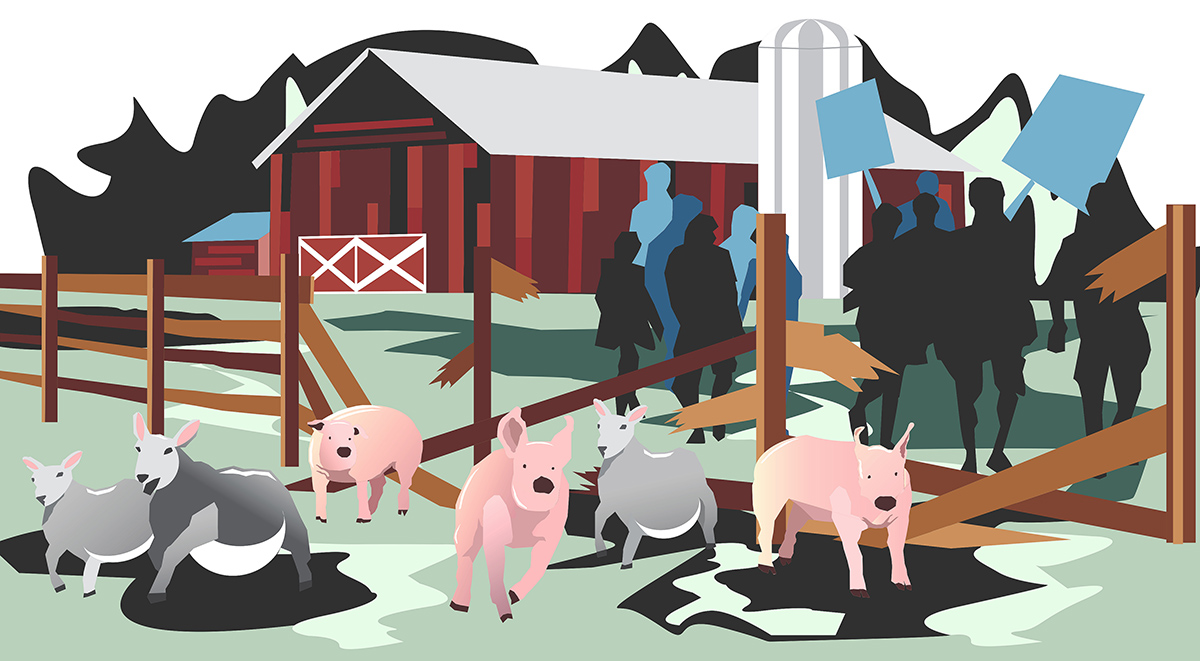Are protestors justified in invading Excelsior Hog Farm?
Protesting can be an effective tool to bring awareness to animal rights, but activists and citizens should be aware of the context surrounding cases of alleged animal abuse.
Four animal activists were charged with 21 charges of break-and-enter and mischief after dozens of protestors invaded an Abbotsford pig farm in April 2019. Excelsior Hog Farm had been under investigation after a video was released with footage of deceased pigs and pigs with ailments at their farm. In response, dozens of protestors entered the farm to “stand in solidarity with the animals,” as protest spokesperson Dan Moskaluk explained to the Abbotsford News.
The B.C. SPCA looked into the released footage, but decided the video was not sufficient evidence to charge the farm. The video was edited, lacked a time stamp, and was anonymously filmed. The hand-held footage was also obtained illegally, by trespassing on the farm at night. I looked at the footage; it was disturbing, but I agree that there was not enough proof to charge the farm. There was no identifying location — a lot of the footage could have been filmed anywhere. In addition, the farm’s veterinarian Josh Waddington believed that the footage was filmed inside a special-care section of the farm, where ailing pigs were under treatment.
The case was reopened in August 2019 when another video of Excelsior Hog Farm was released. The seven-minute video, filmed through hidden cameras, showed longer scenes of farmers interacting with the pigs. They prodded them with electrical prods, hit the walls with boards to get the pigs to move, and pulled dead hogs out of the barn. The SPCA, again, closed the case without charging the farm.
I strongly believe that farms should be held accountable for their actions. Animals should live in clean and safe conditions, and animal abuse must be investigated. However, it is equally important to acknowledge the context surrounding these scenes. Animals can be incredibly stubborn. Prodding animals and scaring them to move are common and non-abusive practices. And, although pulling dead hogs is a troubling image, what other way can a farmer deal with 400 pounds of dead weight? Animals can die at farms, even with the best of care.
It is important to find common ground in what protestors and farmers see in these videos. The protestors tried to find common ground by highlighting animal abuse. However, the protestors who invaded Excelsior Hog Farm held signs that read: “Humane slaughter is a lie,” “If you love animals, don’t eat them,” and “Do what’s right — go vegan.” It seems that these protestors were not simply advocating for farm accountability, but for the end of farming and the eating of meat. This implies that, even if Excelsior Hog Farm was found to treat their animals humanely, the activists would not have been satisfied with the farm’s actions.
Protests are meant to cause disturbance and bring awareness to certain issues, but protestors can go too far — even without inciting violence. Approximately 100 of the protestors stood outside the barn and on the road, while the remaining 60 went into the barns. According to the Abbotsford News, Waddington believed that the protestors in the barns endangered the animals: “What I hope that the public realizes is that by their actions today this group of people have put the livestock at this farm at serious animal health risk.”
One of the protesters’ signs read: “One has the moral responsibility to disobey unjust laws.” There is no moral responsibility to break-and-enter, especially when their actions may harm the animals they are trying to protect.
Activists absolutely have the right to protest against practices and laws they deem unfair. Canadians have freedom of peaceful assembly and freedom of expression, as outlined in the Canadian Charter of Rights and Freedoms. But looking at the protestors’ trespassing and the illegal gathering of evidence, it seems that there are better ways to advocate for the well-being of animals.
It starts with protesting on public property. Activists who protest on private property, including a family-run farm like Excelsior Hog Farm, must move if asked to leave. The 60 protestors who stormed the farm could have protested along the road with the rest of the group — out of respect for the animals, the farmers, and the farmers’ family.
Animal activists could also sign petitions to charge the farm, or contact the B.C. SPCA to incite them to act.
Protesting allows people to advocate for their causes, even if others disagree. However, it is important to become educated on the practices of farming and the context surrounding these types of videos. Animals are a farmer’s livelihood, and invading a farm will not protect these animals.
Animal activists, please keep holding farmers accountable for the best animal care. At the same time, please become knowledgeable of farm practices, be critical of edited video evidence, and exhaust all other efforts before breaking the law.
Animal Protests. (Elyssa English/The Cascade)
Danaye studies English and procrastination at UFV and is very passionate about the Oxford comma. She spends her days walking to campus from the free parking zones, writing novels she'll never finish, and pretending to know how to pronounce abominable. Once she graduates, she plans to adopt a cat.


